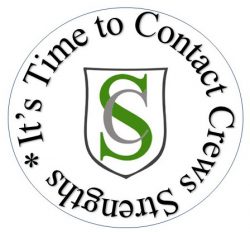Blog
It’s Time to Put Your Strengths to Work for Your Interview – Part 3

In my last post, the interview questions discussed centered around your work experience, the areas of abilities, qualifications, and knowledge. If you missed that or need a refresher, please go here.
In this post, I’ll discuss questions concerning you as an individual. The line between the two is not always precise. Some life experiences questions may be intertwined with some work experience ones. The hope is that you can be prepared for types of questions.
When it comes to you as a person, the interview questions you are likely to have to deal with should fall into the following categories.
- Personality
- Behavioral/Situational
- Opinion
- Quirky
- Stress
I am skipping ahead to items 3-5 in this post to give 1 and 2 a little more space in my next post.
Opinion Questions
Opinion questions are about your outlook or perspective. These do not necessarily have a single correct answer. They are questions to determine what you know about “something” and how you apply what you know to a particular situation or event. While they can be specific or broad, these questions are mostly about how you think rather than what you think.
- “How can we increase sales in this
department?” The interviewer is more interested in your observations than your
actual plan. As an outsider, you only know so much about his organization
- Answer with what you know. “I am aware that you have seen sales increases of 4.7% per year over the last 5 years.” Meaning, I have researched your company.
- “The industry average has been 2.8% to 3%.” Meaning, I know something about the industry “.
- “First, I would complement the team.” Meaning, I know I ‘m not a gift from the solution fairy who is going to fix everything that is wrong at your company.
- “Then, I would look for opportunities, outside of your current customer base to see if we have some additional sales opportunities that I can bring to the table especially from contacts developed during my previous work.” Meaning, the current team is doing great. I support them. Here is something I can add to this great team.
- “How do you describe success?” This is a very subjective question. You should be honest but concentrate on an answer that sounds like it can happen in the job for which you are applying. Winning the lottery, opening a small winery, or hitting a hole in one at Pebble Beach, may be closer to your personal dream of success. None of those things will help your potential employer expand its market share. “Rising to a level where I can positively influence the profitability of the company and develop leaders for its future” sounds like a good answer. Be prepared to describe a scenario in which this could happen. Otherwise, it can sound like a platitude rather than a goal.
When answering opinion questions, if they relate to the interviewing organization, consider hedging your answer, indicating that you don’t know everything about their internal affairs, but as a well-informed person viewing their company from the outside, you believe the best course is XYZ.
Quirky Questions
Quirky questions tend to require you to think outside of the box.
- “What is the volume of this lightbulb?” The interviewer is not interested in the answer. She is interested in how you got to the answer. The over thought answer is to measure various parts of the bulb and try to add them all together. The easier answer is to get a large measuring cup. Fill it with enough water to submerge the lightbulb. Record the amount of water before submerging the bulb. Insert the bulb into the water, just until the bulb is submerged. Record the level of the water. The difference is the lightbulb’s volume. There are probably other methods.
The master of the quirky question was Admiral Hyrum Rickover, U.S. Navy. Frequently referred to as “Father of the Nuclear Navy”, Rickover personally interviewed every officer who was admitted to the nuclear submarine service for a period of over 30 years. His interviews are legendary. Stories abound of questions like, “Do something to surprise me.” The successful answers to which included the interviewee jumping up and sweeping everything off the admiral’s desk or the interviewee breaking one of Rickover’s submarine models in half. While this probably led to screaming and cursing, both approaches apparently worked. Another interview included the question, “Do you like to dance?” A yes answer led to the admiral commanding him to dance with his secretary. The admiral wasn’t auditioning a dancer, nor did he want his submarine model modified. He was looking for an ability to deal with the unexpected. That is frequently what quirky questions are about. Assume some of these responses also helped the admiral to discover his own ability to deal with the unexpected.

Stress Interviewing
The ugly sister (brother?!?) of quirky questions is the stress interview. Stress interviewing is when the interviewer attempts to create a stressful situation to see how well you handle it. Don’t confuse this with the normal stress that interviews tend to create. Stress interviewing is about the interviewer putting the interviewee in a tough position and supposedly seeing how she reacts. It may include burst of anger, intimidation, or bullying. Personally, I think this is rude and unprofessional.
If someone who is interviewing you is rude, yells, curses, then consider this is likely to be how they will behave when you are on the job. However, before writing them and the job off, figure out two things. Will you be in close contact with this person and are you being too sensitive.
I once had a stress interview with the senior most person with which I interviewed. I seriously considered not taking the job because of the way he acted. I asked friends who worked there if I was reading this guy correctly. They said that his interviewing me was a formality. I would not have much direct contact with him. They were right. I may have been in 5 or 6 meetings with this person in a 6-year stay at what was probably the best job I ever had. He had very little effect on my life. By the way, the guy was a jerk and acted like one in every one of those meetings. However, with an average of one meeting per year with this person, the positives greatly outweighed the negatives.

Some people are jerks. Other people are ill equipped to perform certain tasks like interviewing. Someone may think that they will be able to see how well you perform when the going gets tough. As I said in the earlier articles, interviews are weird and mostly indicate your ability to be interviewed. If the interviewer seems to be trying to be intimidating, it could be ignorance not malevolence. If you are a reasonable and mature person, I trust that you will understand the difference. Don’t perceive slights when none are offered. Conversely, don’t put up with nonsense.
Some people are jerks. Other people are ill equipped to perform certain tasks like interviewing. Someone may think that they will be able to see how well you perform when the going gets tough. As I said in the earlier articles, interviews are weird and mostly indicate your ability to be interviewed. If the interviewer seems to be trying to be intimidating, it could be ignorance not malevolence. If you are a reasonable and mature person, I trust that you will understand the difference. Don’t perceive slights when none are offered. Conversely, don’t put up with nonsense.
It is worth being reminded that the line between questions about you and about your work, are not going to be totally segregated. You may be asked a behavioral question that requires you to draw on your skills and work experience. What they are trying to figure out is how you think and how you apply what you know.
If you have gotten to the interview stage, they are interested. Answer the questions. Always remember, they want to know how you will work for them. Couch your answers to respond to their needs. Don’t lie, but do respond so that they can see you solving their problems and not creating new ones. Believe it or not, you got this. You will not get every job. But, you can hold your head high, put you case forward and remember, there are a lot of variables that you don’t control.
Next time, the post will be about personality questions and behavioral or situational questions.
Thank you
Thank you for continuing to read these posts. I trust that you find them valuable.
If you found this post to be of value, please like it and comment on it on LinkedIn at this location.
Helping people stop hating their jobs by finding meaningful, purposeful, engaging work is my goal. If you need help working around your weaknesses, please contact Crews Strengths. If you are considering a job search, creating a resume, deciding to make a career move or figuring out how to put your Strengths to work, please reach out.
Previous Posts
- “It’s Time for You to Ask the Questions!” - August 8, 2024
- What “Superpowers” are Hiding in Your Toolbox?: - May 29, 2024
- It’s Time to Put Your Strengths to Work for Your Interview – Part 4 - October 16, 2023
- It’s Time to Put Your Strengths to Work for Your Interview – Part 3 - August 21, 2023
- It’s Time to Put Your Strengths to Work for Your Interview – part 2 - July 20, 2023
- It’s Time to Put Your Strengths to Work for Your Interview - June 22, 2023
- It’s Time to Put Your References to Work - February 14, 2023
- It’s Time to Work Around Your Weaknesses - November 15, 2022
- It’s Time to Put Your Skills, Talents, Strengths (and even Weaknesses) to Work! (Once you figure out what they are). - October 13, 2022
- It’s Time to Put Your Strengths to Work: Why Hire a Coach? - August 1, 2022
- It’s Time to Put Your Strengths to Work: Rejection and the Job Search - June 25, 2022
- No One Deserves to HATE Their Job! : Your Solution to the “Great Resignation” - May 23, 2022
- It’s Time to Put Your Strengths to Work: Strengths and the Reentry Career Alliance Academy - March 3, 2022
- It’s Time to Put Your Resume to Work: Part 11. An Inventory of Your Career: Resume as Assessment - February 3, 2022
- Have Yourself a Merry Little Job Search: - November 23, 2021
- It’s Time to Put Your Resume to Work: Part 10. - October 21, 2021
- It’s Time to Put Your Resume to Work: Part 9 – Avoiding the Trash - August 25, 2021
- It’s Time to Put Your Resume to Work: Post 8. How Dressed Up Does Your Resume Need to Be? - July 20, 2021
- “It’s Time to Put Your Resume to Work” : Part 7: What to Do When You Don’t Meet All the Requirements - June 24, 2021
- “It’s Time to Put Your Resume to Work”: Part 6. Avoiding the Mundane, Boring, and Useless - May 26, 2021
- “It’s Time to Put Your Resume to Work”, Part 5 – Creating a Universal Resume (When you Don’t have All the Facts) - May 5, 2021
- “It’s Time to Put Your Resume to Work” – Part 4: Finding the Words (literally) - April 7, 2021
- BONUS – “It’s Time to Put Your Resume to Work”- Part 3a : What is the Correct Length for Your Resume? - March 25, 2021
- “It’s Time to Put Your Resume to Work”- Part 3 : The a la Carte or Customizable Resume - March 16, 2021
- It’s Time to Put Your Resume to Work – part 2 - February 9, 2021
- It’s Time to Put Your Resume to Work – part 1 - January 27, 2021
- Strengths Help You Hear the Music - October 20, 2020
- StrengthsFinder & the Ancient Philosopher - September 3, 2020
- StrengthsFinder Domains: A View of Your Strengths from 50,000 Feet - July 20, 2020
- Talents are Your Edge in a Job Search - June 25, 2020
- This Is Who You Are and That’s A Good Thing - May 22, 2020
- Introvert or Extrovert: A CliftonStrengths view - May 13, 2020
- Is It Time to Put Your “Superpowers” to Work? - April 10, 2020
- Who Are You? - April 3, 2020



